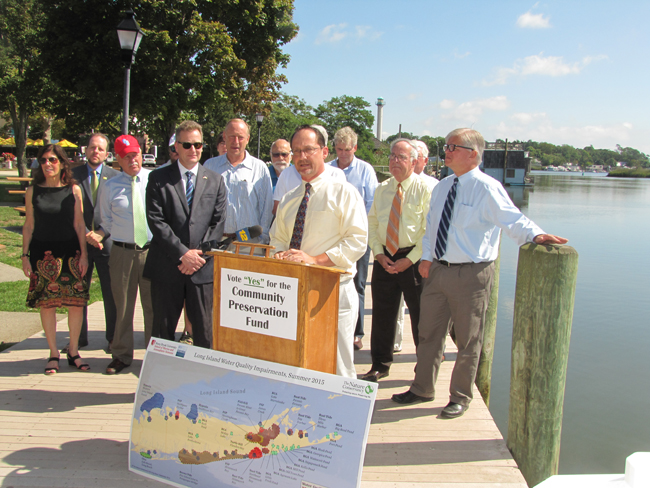Campaign launched to urge voter approval of CPF extension


After deciding between Trump and Clinton, remember to flip the ballot on Election Day.
A new coalition called “Clean Water and Community Preservation Coalition” is reminding voters in advance of the November election to vote on a proposition to extend the land transfer tax that creates the Community Preservation Fund for the five East End towns. To do so will require voters to flip to the back side of the ballot, where all propositions will be listed.
“The slogan for this campaign is ‘you really ought to flip over the ballot,’ ” said Richard Amper of the Long Island Pine Barrens Society.
The group held a press conference Thursday morning in Riverhead to announce its upcoming campaign to urge support for the CPF extension in November.
“We will be running mail, print ads, radio ads and electronic media from the end of September through Election Day,” said Kevin McDonald of the Nature Conservancy.
The new coalition’s membership comprises representatives from more than 50 civic organizations, businesses, environmental groups, and others, and on Thursday morning, several of them were joined by local political leaders to kick off support for the proposition.
The CPF was created in 1998, when voters in all five East End towns approved a referendum to create a two-percent land transfer tax, with that money going toward open space and farmland protection. It’s been extended by East End voters several times since then.
To date, more than $1.1 billion in CPF funds have been spent to preserve more than 10,000 acres of open space and farmland, officials said.
The November proposition would extend the life of the two-percent tax from 2030 — when its currently due to expire — to 2050.
Prior Coverage: CPF referendum, with an asterisk, in the works
Prior Coverage: Cuomo OK’s changes to CPF regs
It also would, for the first time, allow the money to be used on water quality projects, such as sewer upgrades, aquatic habitat restoration projections and pollution prevention projects.
“That is so essential to this region, I can’t even express my pleasure,” said Riverhead Supervisor Sean Walter, whose town has had to upgrade its sewage treatment plant to the cost of more than $20 million.
All five East End towns have passed resolutions scheduling the referendum, which will actually be a separate referendum in each town, according to state Assemblyman Fred Thiele (I-Sag Harbor).
While farmland and open space preservation has been the main focus of the CPF up until now, a yes vote on the fall proposition will enable officials to begin a transformation to add water quality protection to its goals as well, Mr. McDonald said.
The CPF will continue to be used for farmland and open space protection, and will not be abandoning those goals, he stressed.
“A number of years ago, it was brought to our attention that the Peconic River was being polluted by cesspools on its banks,” Senator Ken LaValle (R-Port Jefferson) said at the press conference. “We never really thought about it, but when you saw pictures of open cesspool covers and pollutants going into the Peconic, that visual was incredible.”
Officials at the county level also have recently begun taking steps to consider alternative septic systems that remove nitrogen from groundwater discharges, something officials say traditional cesspools don’t do.
Since the fund is generated by a percentage of real estate transfers, the higher price housing on the South Fork has generated far more in CPF revenue than it has on the North Fork, according to Mr. Thiele’s office.
Since 1999, the town of Southampton has generated $640 million from the CPF, while East Hampton Town has generated $305 million.
On the North Fork, Southold Town generated $74 million; Riverhead Town $51 million and Shelter Island Town $23 million.
Asked afterward if water quality programs could be funded by CPF revenues from a different town — for example Southampton contributing to upgrade Riverhead’s sewage treatment plant, which discharges into the Peconic — Mr. Thiele said there is nothing in the law now that would prevent one town from allowing its CPF money to be spent in another town, but, to date, that has never happened.







